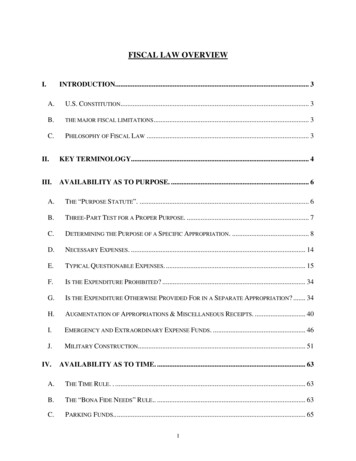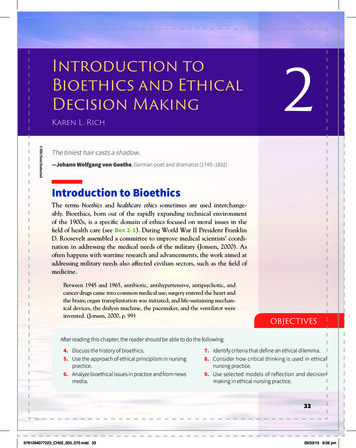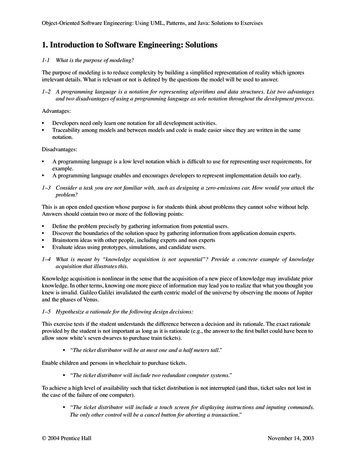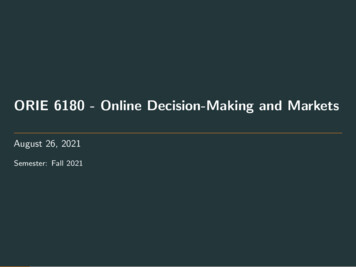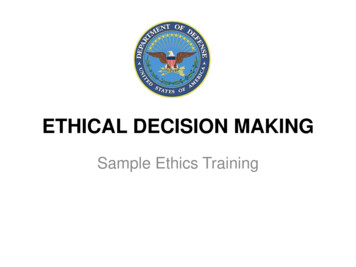
Transcription
ETHICAL DECISION MAKINGSample Ethics Training
TRAINING OBJECTIVESTo better equip Department of Defense(DoD) personnel to: Evaluate ethical dilemmas Make ethical decisions relying on, both,ethics rules and fundamental ethicalvalues
TRAINING OBJECTIVES Highlight several key ethics rules, usingrecent examples of unethical conduct, asappropriate These examples remind us of ourobligation to comply with ethics laws andregulations and how to seek legal advice,when we need it
TRAINING OBJECTIVESWe will also focus on how to navigate innuanced or gray areas: When the ethics rules don’t provide a clearanswer or are silent on the propriety of aproposed action The rules require subjective judgment todetermine the propriety of the proposedactivity
COMPONENTS OF ETHICALDECISION MAKING Do the ethics rules permit me to take aproposed action/May I proceed? (Thelawyers generally make these calls) If yes, should I proceed? Query to Self: What are the benefits to DoD ifI take the proposed action and what are theRISKS? (Generally, not a legal question)
INSERT Insert here a summary of recent casesthat will be of most interest to yourpersonnel
ETHICAL RULES IMPLICATED In addition to violations of the criminal conflict ofinterest laws, these cases highlight a variety ofviolations of the regulatory Federal Standards ofConduct:–––––Use of public office for private gainDisclosure of non-public informationAcceptance of gifts from prohibited sourcesGiving preferential treatment/favoritismLoss of impartiality in performance of duties
CASES REFLECT DISREGARDOF CORE ETHICAL VALUES Beyond violations of law and regulations,these cases demonstrate a disregard forthe fundamental values of the DoD – Integrity– Respect– Accountability– Selfless service– Personal courage, and– Stewardship of the taxpayer’s
WHAT ARE ETHICAL VALUES? Ethics are standards by which one shouldact, based on values– Values are core beliefs that motivate attitudesand actions– Ethical values relate to what is right andwrong– Ethical values demand that our actions notonly comply with law, but promote publicconfidence
Service Core ValuesArmy LoyaltyDutyRespectSelfless ServiceHonorIntegrityPersonalCourageMarines Honor Courage CommitmentNavy Honor Courage CommitmentAir Force Integrity First Service before Self Excellence in allwe do
ETHICAL PRINCIPLES OFFEDERAL SERVICE Basic obligations of public service highlightedin the Federal Standards of Conduct, e.g.:––––Remain impartial in all official business and dealingsAvoid using public office for private gainProtect and conserve federal propertyAvoid holding financial interests that conflict with theconscientious performance of duty– Do not engage in financial transactions usingnonpublic Government information or allow theimproper use of such information to further anyprivate interest
DOD CORE VALUESChapter 12, Section 4 of the Joint EthicsRegulation, e.g.:– Honesty– Integrity– Loyalty– Accountability– Respect– Fairness– Caring
CORE VALUESCore values help us navigate the “grayareas” when the law is either silent orrequires subjective judgment to determinethe propriety of the proposed activity
MANAGING OPERATIONAL& ETHICAL RISKSEthicalRiskOperationalRiskBoundaries constitute the legal rules
COULD VS. SHOULD When making an ethical decision ask twoquestions:– Do the ethics rules permit me to take aproposed action (may I)?– If so, should I take the action? Would myaction create an appearance that I am lessthan fair and impartial – or cause a reasonableperson to question the integrity of DoDbusiness processes.
LEGAL, BUT IS IT PRUDENT?HYPOTHETICALA senior official asks if he can travel at theGovernment's expense to attend a 30-minuteaward ceremony. The ceremony occurs during acharitable organization’s gala in which asubordinate in the official’s organization will behonored for valor. The Gala will be in Las Vegas.May he attend at the Government’s expense?Should he?
LEGAL, BUT IS IT PRUDENT?HYPOTHETICALInsert a customized hypothetical for youraudience to discuss.
HOW LEADERS MAINTAIN ASTRONG ETHICAL CULTURE– Set ethical expectations using fundamental ethicalvalues (e.g., Integrity, Personal Courage, Stewardshipof Taxpayers’ ) as the foundation.– Lead by example (tone set at the top) – and hold selfand others accountable.– Remove fear of retaliation from organization climate.Promote candor to the leadership.– Foster environment where subordinates go beyondasking “Is this legal?” to “Is this prudent?” By doingthis, employees take ownership of culture.– Reward courage, selfless service, protecting fiscal.
THE CHARACTERTHAT TAKES COMMAND“The character that takes command in moments of crucialchoices has already been determined. It has beendetermined by a thousand other choices made earlier inseemingly unimportant moments. It has been determinedby all the little choices of years past — by all those timeswhen the voice of conscience was at war with the voice oftemptation — whispering the lie that it really doesn't matter.It has been determined by all the day-to-day decisionsmade when life seemed easy and crises seemed far away— the decisions that, piece by piece, bit by bit, developedhabits of discipline – or of laziness, habits of self-sacrifice— or of self-indulgence, habits of duty and honor andintegrity — or dishonor and shame.”— Ronald Reagan, The Citadel, May 15, 1993
When All Else Fails ASK!
When making an ethical decision ask two questions: –Do the ethics rules permit me to take a proposed action (may I)? –If so, should I take the action? Would my action create an appearance that I am less than fair and impartial –or cause a reasonable pe
